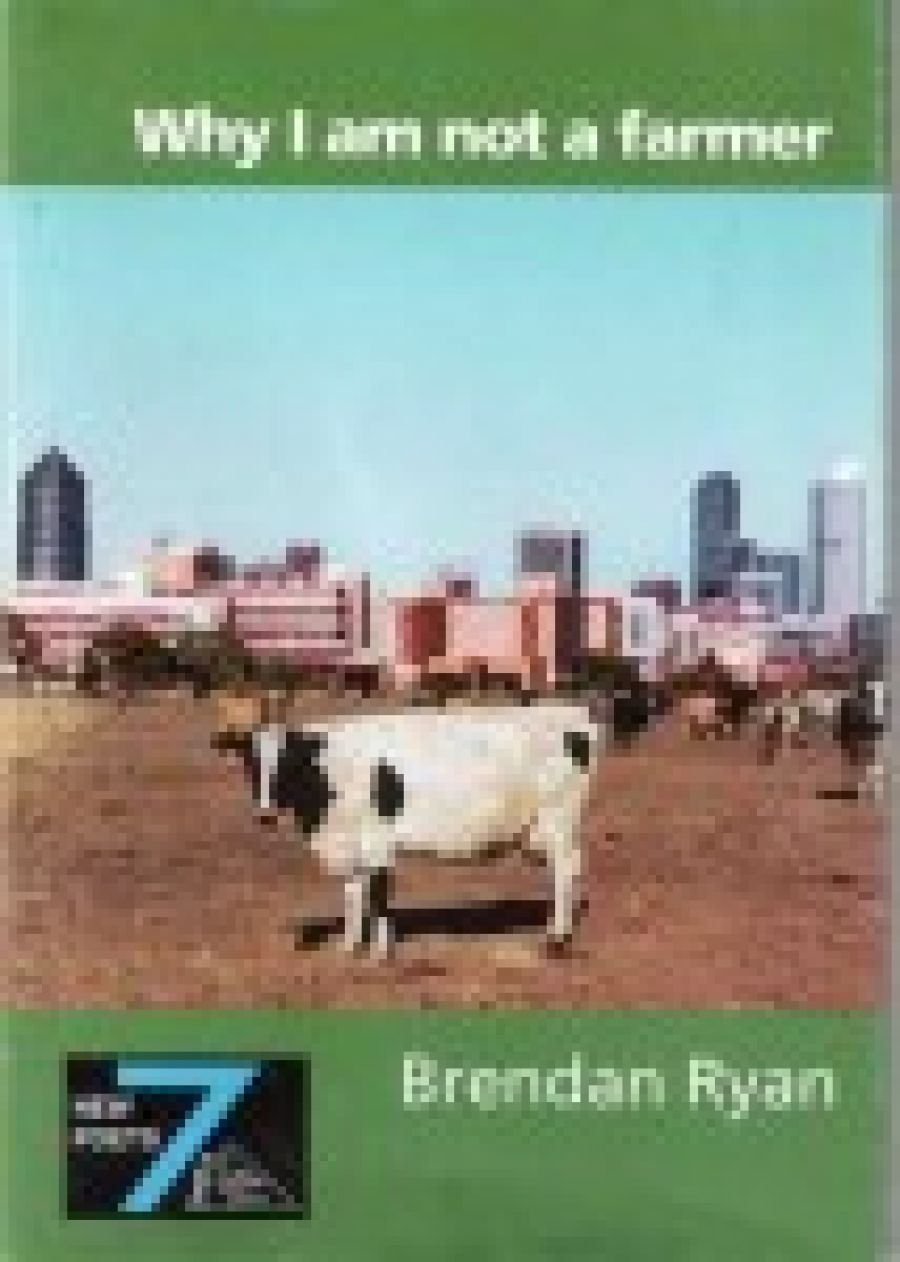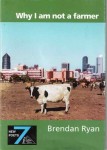
- Free Article: No
- Contents Category: Poetry
- Review Article: Yes
- Article Title: Six New Poets
- Online Only: No
- Custom Highlight Text:
The new books from Ron Pretty’s Five Islands Press are impressive début collections. Importantly, where are the poets taking us? Are there discernible trends? Without generalising excessively, violent themes recur and the poets are interested in how societies transgress their limits. The collections have a narrative or developmental thrust often well served by the ordering of the poems. There is forthrightness; the language is clear, attentive, and contemporary. Best of all, the poems aren’t dull.
- Book 1 Title: Why I am Not a Farmer
- Book 1 Cover Small (400 x 600):

- Book 1 Cover (800 x 1200):

In Fatherlands (Five Islands Press, $9.95 pb, 32 pp), B.R. Dionysius deals with the tension between aggression and identity. A central question he asks is: ‘What is it that makes little / boys into little soldiers?’ (‘My daughter & I at the end o the century’). The poems can be read as a circular journey between the young boy who we see killing beetles in ‘Cockatrice’ and the philosophical speaker of the later, evolutionary fable ‘Stung’. The ‘Fatherland’ of the title (with all its iconic rippling associations) is multi-determined and, although enlightened by his own fatherhood (‘Almost Sixteen Months’ and ‘Crossing’), Dionysius, I suspect, enjoys poems that refuse easy answers. His own are subtle and demand the rewards of rereading. Landscapes are often internalised psychologically into darkly fabulous places where boundaries blur between right and wrong, real and unreal. Some resemble dreamscapes which allow Dionysius to successfully comment on environmental degradation: ‘In the forest of V2 rockets / a clarinet of log reclines; / the deep notes of its decay / imperceptible to the ear’ (‘In a Forest of V2 Rockets’). Dionysius’s work has depth, nuance, and an awareness of the formal properties of verse. Unlike the anonymous subject of the poem The Cold Work of Stones’ who sinks without ripples, with this book, Dionysius will continue to make a splash.
B
rendan Ryan’s poetic is evident in the title he has chosen for his first collection, Why I Am Not a Farmer (Five Islands Press, $9.95 pb, 32 pp). In precise, observant language he details the often-brutal life of dairy farming. Vignette poems describe elemental experiences, such as smashing eels: ‘At fourteen, it was something to do’ (‘Eel conditions’); birthing calves or dehorning the stock soon ‘nosing up to the logic of a fence, / like two brothers who can eat a meal / without uttering a sound’ (‘The Boxing Day Test’). The poetry is attentive to the suffering of the animals and clarifies the emotional distance necessary to accommodate the work. The numbing routine of a life where a father ‘knows this paddock by its drains / mounds of old fence lines / the distance between troughs’ (The Best Day in his Life’) is counterbalanced by the more restless landscape Ryan filters through his wry intelligence. The placement of the penultimate poem ‘The Killer’ effectively highlights its drama – the scene is reminiscent of the butchered whales in Melville’s Moby Dick. Generally, Ryan’s city poems seem pale in contrast to the powerful country poems. Yet the split is artificial as we find in the fine poem ‘The Benefits of a Rotary Dairy’ in which Ryan comments on the changing of rural traditions, at the same time meditating upon his own relationship with his family. The poem is spoken through the clear eye of one who has gained distance but hasn’t left any part of the Western District behind.
Hope in Hell (Five Islands Press, $9.95 pb, 32 pp) by Sarah Attfield is a cycle of working-class voices energising the difficult conditions of life in the English equivalent of the Australian Commission Flats and the US Projects. The work resides in the favoured territory of Mike Leigh films embracing the battlers: ‘everywhere I go / some one’s pulling me down / ready to snap’ (‘Bringing Me Down’); snatches of folksong: Knees up! knees up! / don’t get the breeze up / knees up muvver brown! / days’ (‘What a Rotten Song’); and characters whom Attfield brings to life without stereotyping. The collection, libretto in structure with introductory poems and the recurring note of the Manor interpretations (‘The Manor 1-5’), is non-judgmental. Attfield’s social observations: ‘she thinks it would be less cruel / if they’d built this place as / far from pleasure / as possible’ (‘Life in Boats’) linger and inform. I particularly liked the third section of the poem, ‘Welcome’, in which the character Kevin can’t escape his neighbours’ noisy sex. Hoarse and claustrophobic, the poem makes a poignant statement about frustrated human desire and its relationship to overcrowding.
Annemaree Adam’s poems skateboard around and over language in The Dogs (Five Islands Press, $9.95 pb, 32 pp). Poems ‘jesus’, ‘for my mother’, ‘the Surgery’, ‘first born’, and ‘tiger balm’, although concerned with familiar subjects such as religious meditation, relationship with parents, birth, and sensuality are unconventionally lyrical. Curiously, Adams often uses unsourced epigraphs (perhaps meaning to subvert that sometimes turgid tradition?). More difficult are the poems which react against tragic events in places like Sarajevo, Rwanda, Timor, and Texas. Here, using reportage to springboard her imagination, Adams is working in a tradition similar to the Pulitzer Prize winning American poet, Ai. Like Ai, Adams avoids the dangers of voyeurism, her directness giving the poems moral integrity: ‘he bleeds himself to keep his mind at home / not go back there by the lake where the waves slice / sharp and dark against the limbs of those by the shore’ (‘Lake Kivu, Rwanda’).
In birthmarks (Five Islands Press, $9.95 pb, 32 pp), Lucy William’s holistic poems invite a warm response. They are marvellously resolved works (often imaginative interpretations of other art forms) which bring to mind the comments by the poet George Seferis, that ‘poetry often shows us the things we were looking for which we would not have sought if we had not found them already’. Williams illuminates experiences we might not have recognised until her poems articulated those experiences reunions for example: ‘the room is full of people meeting for the first time’ (‘reunion dinner); hasty sex as in ‘waitress’; or what it’s like to be a female, fifty and enjoying it: ‘back on land she is hungry sexy / wanting fast heat hot food / a quick fix behind the cliched dunes’ (‘fifty’). A sign of William’s talent is her technical facility with endings and her ability to evoke honest emotion, pressing it seamlessly into the poem. Her style resembles the atmospheric paintings of Edward Hopper, whom she references, as in the evocative ‘office at night: Her strong legs are pure sunlight / there will be a morning of a waking together / his face slack in her jewelless neck / the smell of them like a stale romance’.
Admissions (Five Islands Press, $9.95 pb, 37 pp) by Jen Crawford is a continuous poem, the individual components numbered as if in a Rumi song cycle. But the story is harrowing. We follow the character, Ruth, through commitment, medical investigations, and subsequent psychological disintegration, the psyche itself becoming the subject of a surreal and painful half-life. Crawford writes compassionately about parents unable to prevent their child’s suffering: ‘Her parents hesitate / at the door, by the bed, / as if they were a pair of hands / and something had slipped between them / – like soap, or sand –’ (‘20’). As Ruth’s world narrows to the institutional we, also, are trapped. Admissions is a mysterious, unanswerable book. Formally, the structure is brilliant. In the ‘psychiatry’ section, the poems disintegrate into blocks of raw, pressured thought; time and identity distort giving the reader an experience of disorientation. Ultimately, Admissions is a fierce protest (in the tradition of Antonin Artaud) against pseudo-benevolent systems. It seems no accident that the protagonist is named Ruth, the biblical woman of love and beauty, who, when forced to choose between remaining home or going to a foreign country, took the hard road.


Comments powered by CComment